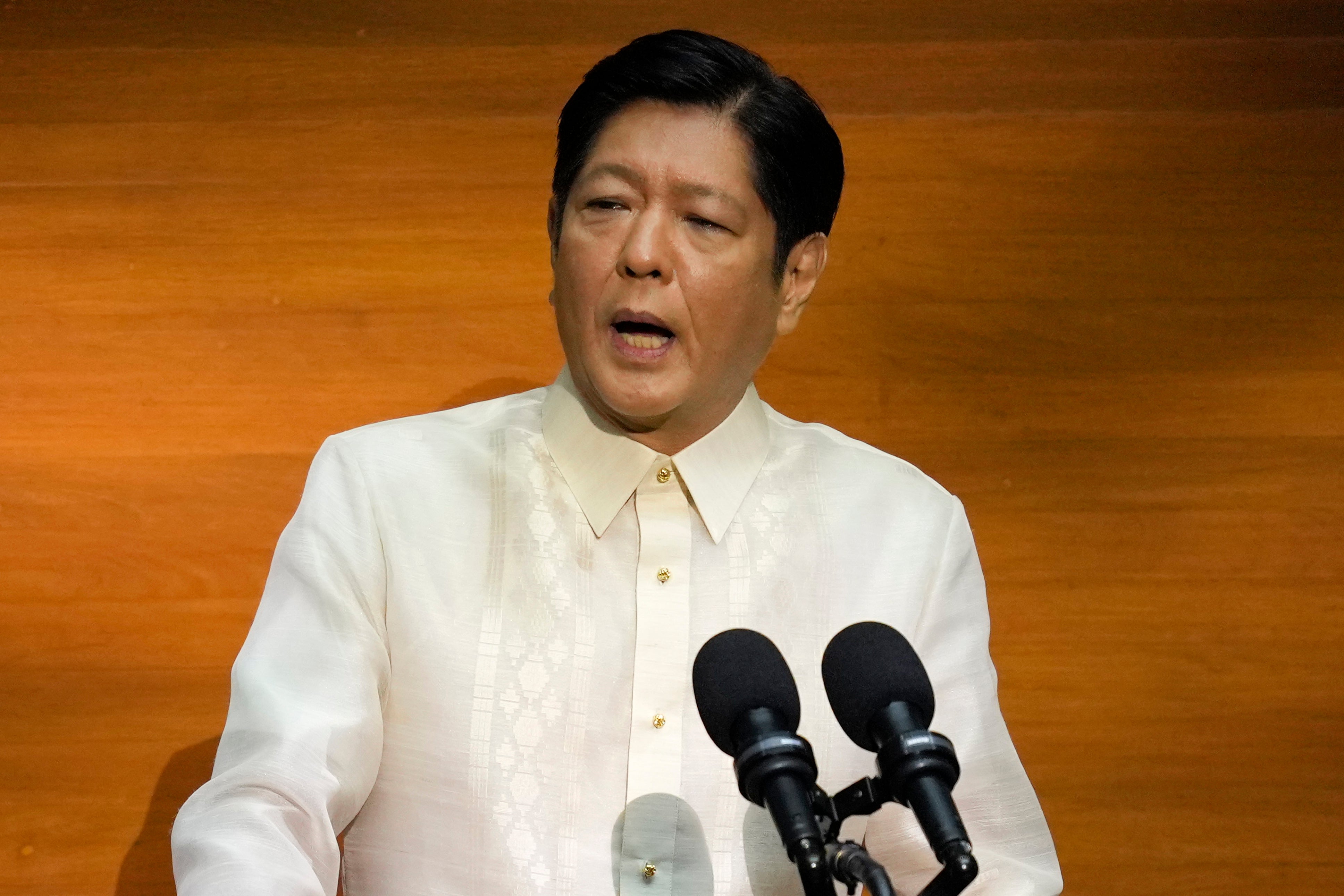Philippine leader says calling his father dictator `wrong'
Philippine President Ferdinand Marcos Jr. says it’s wrong to describe his late father as a dictator and that his brutal martial law rule in the 1970s was not meant to prolong his grip on power

Your support helps us to tell the story
From reproductive rights to climate change to Big Tech, The Independent is on the ground when the story is developing. Whether it's investigating the financials of Elon Musk's pro-Trump PAC or producing our latest documentary, 'The A Word', which shines a light on the American women fighting for reproductive rights, we know how important it is to parse out the facts from the messaging.
At such a critical moment in US history, we need reporters on the ground. Your donation allows us to keep sending journalists to speak to both sides of the story.
The Independent is trusted by Americans across the entire political spectrum. And unlike many other quality news outlets, we choose not to lock Americans out of our reporting and analysis with paywalls. We believe quality journalism should be available to everyone, paid for by those who can afford it.
Your support makes all the difference.Philippine President Ferdinand Marcos Jr. said it’s wrong to describe his late father as a dictator and that his brutal martial law rule in the 1970s was not meant to prolong his grip on power — comments that were immediately rejected by human rights activists.
The namesake son of the former president who was ousted in a 1986 pro-democracy uprising also denied in a TV interview aired late Tuesday that he and his family were whitewashing history.
It was the first time since he took office in June that Marcos Jr. has addressed some of the controversial issues that have hounded him and his family. A transcript of the interview on new broadcasting company ALLTV by TV host and actress Toni Gonzaga, who backed Marcos Jr.'s candidacy, was released by his press secretary.
Asked if he has been affected by media references to him as a dictator’s son, Marcos Jr. replied: “No. It would hurt me if they were right, but they’re wrong.”
“How many times have I been here in this room where he was in consultation with different groups?” he said in the interview at the Malacanang presidential palace in Manila, where his father held office after rising to the presidency in 1965. “A dictator does not consult. A dictator just says `this is what you will do, whether you like it or not.’”
The elder Marcos placed the Philippines under martial law in 1972, a year before his term was to expire. He padlocked Congress and newspaper offices, ordered the arrest of many political opponents and activists and ruled by decree.
Marcos Jr. defended that decision by repeating his father's justification that martial law was crucial to fight growing Muslim and communist insurgencies. “It was necessary to — in my father’s view at the time — to declare martial law because a war was really raging already at the time,” he said.
Renato Reyes of Bayan, an alliance of left-wing groups, said the newly elected president’s defense of the martial law declaration nearly 50 years ago was a “big lie,” which has been discredited by facts.
“Marcos Sr. used martial law to scrap the elections, extend his term, dissolve Congress and centralize power unto himself, making him dictator from 1972 to 1986,” Reyes said. That was not defending government but making government “your personal fiefdom.”
Asked why his father's basis for declaring martial rule was not widely disseminated, Marcos Jr. said, “The government fell. So, the victors wrote this history.”
Opponents of the Marcos dictatorship had also said that violent incidents in the early 1970s, including the ambush of a convoy supposedly carrying then defense chief Juan Ponce Enrile, were staged to provide the justification for martial law.
Enrile later broke off from Marcos and together with other rebellious military and police officials backed a massive 1986 “People Power” uprising that toppled Marcos and drove him and his family to U.S. exile. The massive protests awed the world and became a harbinger of change in authoritarian regimes worldwide.
Marcos Jr. denied he and his family were trying to revise history but acknowledged without elaborating “the problems that happened, the abuses that occurred, like in any war.” He said he can prove what actually happened, saying “we have video, we have photographs, we have records,” but did not go into detail.
The ousted president died in exile in Hawaii three years later without admitting any wrongdoing, including accusations that he and his family amassed an estimated $5 billion to $10 billion while he was in power.
A Hawaii court later found him liable for human rights violations and awarded $2 billion from his estate to compensate more than 9,000 Filipinos who filed a lawsuit against him for torture, incarceration, extrajudicial killings and disappearances.
His widow, Imelda Marcos, and her children were allowed to return to the Philippines in 1991. They have since made one of the most dramatic political comebacks in history that was capped by Marcos Jr.’s landslide election victory in May.
He attributed the win to his steadfast campaign call for national unity but critics said it was the outcome of a well-funded social media propaganda aimed at burnishing the Marcos name.